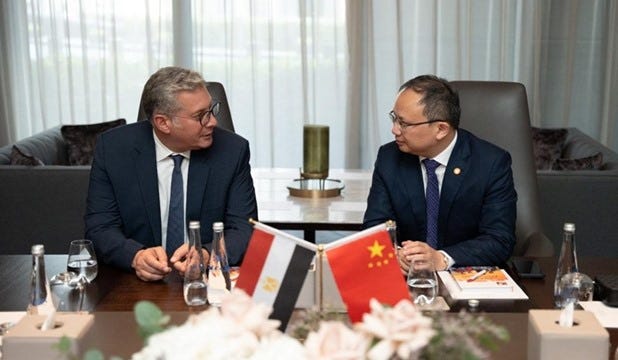Egypt’s BRICS Win Clears Path for China in North African Energy Race
China is reaping gains from Washington’s tariff threats.
On 30 July, Egypt’s Minister of Petroleum held talks with the Chairman of United Energy Group (UEG), Regional President for Africa, in Dubai to explore areas of cooperation. The meeting culminated in the signing of a memorandum of understanding (MoU) between the Ministry of Petroleum and Mineral Resources and China’s UEG. The agreement centres on oil and gas exploration in Egypt, with an eye towards potential collaboration in renewable and green energy initiatives down the line.
This development echoes Egypt’s nuclear plant agreement with Russia earlier this year, which followed controversial remarks by U.S. President Trump regarding Gazan displacement. Now, Cairo appears to be capitalizing on Washington’s tariff escalation and economic unpredictability by leveraging its BRICS membership to secure strategic concessions: Egypt intends to cement its role in the increasingly competitive North African energy landscape, paving the way for China’s Belt and Road Initiative (BRI) to expand into the region.
North Africa’s BRI
Hong Kong-listed UEG has steadily rode the BRI and built a strong presence across the Middle East and North Africa, particularly in Iraq and Egypt. Leveraging its regional experience and operational success, UEG is now significantly expanding its footprint in Egypt’s energy sector
In February 2025, UEG acquired Apex International Energy’s upstream assets in Egypt’s Western Desert for $150 million, doubling its production. This strategic acquisition elevated UEG into the ranks of Egypt’s top 10 oil and gas producers. It follows UEG’s initial entry into the Egyptian market in 2019, when it acquired Kuwait Energy for $900 million. This surge in activity reflects a broader trend of increasing Chinese investment in Egypt’s energy sector. Just a day before the UEG–Ministry agreement, China’s LONGi signed an MoU with Egypt’s United Energy to develop a hybrid solar power project. In addition, a $7.5 billion petrochemical agreement was signed in Beijing between Egypt and the China National Chemical Engineering Company (CNCEC), with CNCEC expected to finance up to 85% of the project. Strategically located near the Suez Canal, the project further strengthens China’s regional footprint.
Together, these developments signal a sharp rise in Chinese energy engagement in Egypt, with three major deals signed in 2025 alone, marking a shift from more sporadic investments in previous years. This comes alongside recent China–Libya talks to revive a national railway project, formalised through an MoU between Libya’s Railroads Project Execution and Management Board and China Civil Engineering Construction Corporation. With planned routes extending to the Tunisian, Chadian, and Nigerien borders, Beijing may be laying the groundwork to capitalise on the intensifying energy race across North Africa.




